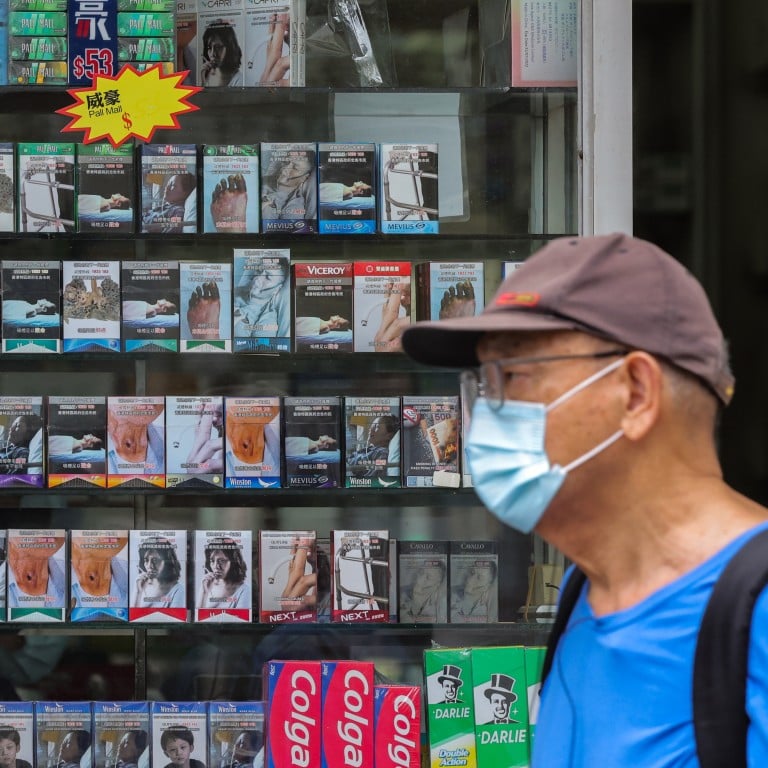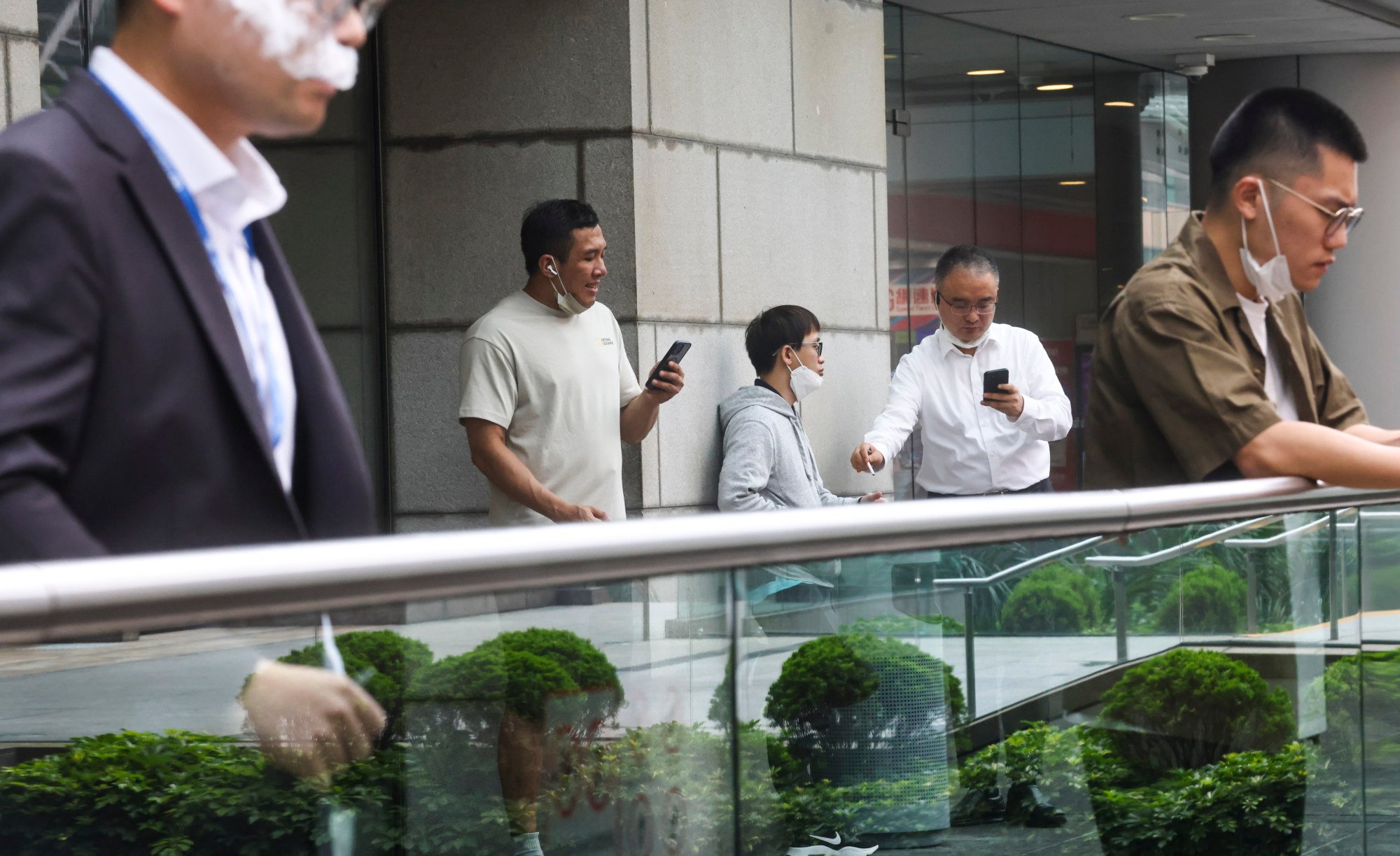
Hong Kong must sharply raise tobacco tax, consider ‘smoking’ permit to ensure reduction targets are hit, government advisers say
- Proportion of residents who smoke cigarettes falls below double digits for first time, but use of e-cigarettes jumps nearly 150 per cent in last two years
- Smokers say they will quit if the median price for a pack of cigarettes hits HK$100, according to local research
Bolder steps are needed to reach Hong Kong’s “endgame” of a 5 per cent smoking rate and a midway goal of 7.8 per cent by 2025, including raising the levy on tobacco products, government advisers have said.
Dr Daniel Ho Sai-yin, an associate professor of the University of Hong Kong’s school of public health, suggested doubling the tax on cigarette packs to HK$76 (US$9.70) each, which would push the retail price to roughly HK$97.
Ho is also a member of the Hong Kong Council on Smoking and Health, which aims to educate the public and advise the government on the habit.
Hong Kong principals demand full e-cigarettes ban after under-10s seen smoking
He cited local research that found respondents said they would quit smoking if the median price for a pack of cigarettes hit HK$100.
“The tobacco tax has not risen since 2014, and the last big increase was in 2011, more than 10 years ago. An increase is long overdue,” Ho said.
Medical sector lawmaker Dr David Lam Tzit-yuen, who is also a council member, agreed with Ho and suggested increasing the tobacco tax by at least 40-50 per cent.
“This is a message to show the public that the government is taking the matter seriously,” he said. “We are not discriminating against those who smoke as we understand that it’s hard to quit smoking.”
To further prevent people from smoking, Lam suggested giving a card to those who had the habit. Only those with the card could buy cigarettes.
Their recommendations came as authorities said the proportion of residents who smoked cigarettes had fallen below double digits for the first time, but use of e-cigarettes had jumped by nearly 150 per cent in the past two years.
The proportion of residents who smoked fell to 9.5 per cent in 2021, down from 10.2 per cent in 2019. A target earlier set by the government aims to bring the rate down to 7.8 per cent by 2025.

The number of people using e-cigarettes surged from 7,200 in 2019 to 17,500 last year, but the overall statistic for those using tobacco products registered a drop. About 8,400 people were using such products last year compared with 13,100 in 2019.
Short of increasing taxation, Secretary for Food and Health Sophia Chan Siu-chee is considering more aggressive initiatives, such as further restricting public smoking areas, raising the minimum age for buying cigarettes, and regulating their flavouring and displays to decrease their appeal.
She also pointed to a ban by New Zealand on cigarette sales set to be imposed on those born after 2008.
“It could send the right message to potential smokers about how smoking can ruin people’s health,” Ho said in response to Chan’s remarks.

Calling the government’s proposal a big step forward, Lam said it was unavoidable that a black market for tobacco would arise if the city adopted New Zealand’s strategy.
“But it’s like the case of drugs, we won’t be discouraged just because of a possible black market,” he said.
To further reduce the city’s smoking rate, authorities banned the import, manufacturing, sale and distribution of alternative smoking products, such as electronic cigarettes and heated tobacco items, on April 30.
But residents had mixed reactions towards the authorities’ ban on e-cigarettes.
Alex Brutus, a 25-year-old schoolteacher, did not smoke cigarettes but began using e-cigarettes 2½ years ago.
“The ban [on e-cigarettes sales] sucks. I hate actual cigarettes. I think if more bans are in place I’ll just stop smoking overall,” he said.
“I support more rules on regular cigarettes, it’ll make it harder for people to get access to what they prefer. It’ll definitely reduce the number of users over a period of time.”

Martina Igini, 25, an assistant editor who smokes cigarettes, said the ban would not affect her personally, but she could “totally see people stopping because it’s just too hard to find supplies”.
“But I feel that a ban on e-cigarettes would just lead more people to smoke normal cigarettes again, which is the worst thing that can happen,” she said.
“If you want people to stop smoking cigarettes just increase the price; [banning] mint alone won’t change things.”
New Zealand is set to become the first country in the world to implement a “tobacco-free-generation” policy, after the government announced last year that anyone born after 2008 would be banned from buying tobacco.
Smoking rates have steadily fallen in New Zealand for years, with only about 11 per cent of adults now smoking and 9 per cent smoking every day.
Tobacco giant warns it may close HK$78 million research centre
Singapore has also progressively raised the minimum legal age at which tobacco products can be bought from 18 to 21 years of age. It also made it illegal to possess, purchase or use vaporisers in 2018.
The Coalition on Tobacco Affairs said it supported the introduction of tobacco-control policies, adding that “pragmatic, gradual and science-based” regulations were the only way to protect the public from the danger of tobacco use.
Meanwhile, Chan on Friday said the government would bolster the promotion of smoking cessation efforts in order to reach the midway goal.
Chan said that when smokers who suffered from illnesses sought medical help, healthcare service workers should seize every opportunity to help them quit the habit, including by providing medication.
She said designating part of transport interchanges as non-smoking areas was a slow process for the government, but it wanted the zones to cover entire areas where people queued for transport.
Additional reporting by Victor Ting and Nadia Lam


